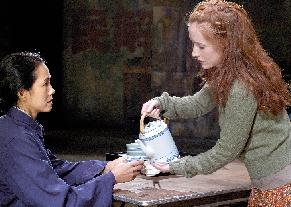SEARCH
REVIEWS
FEATURES
NEWS
Etcetera and
Short Term Listings
LISTINGS
Broadway
Off-Broadway
BOOKS and CDs
OTHER PLACES
Berkshires
London
LA/San Diego
Philadelphia
Elsewhere
QUOTES
On TKTS
LETTERS TO EDITOR
FILM
LINKS
MISCELLANEOUS
Free Updates
Masthead
Writing for us
A CurtainUp Review
No Foreigners Beyond This Point
|
I can’t figure anything out here. One minute I think it’s communism that’s crippled it, then I think, no, this is still Confucianism, then
--- Andrew Could you maybe give it a rest, for one night? --- Paula |

Karen Tsen Lee & Abby Royle
(Photo: David Gochfeld) |
They have been almost surreptitiously invited by the local school officials in Guangdong, China to be English instructors at the Da Lang Institute of Foreign Trade which is located not far from Guangzhou, the political, economic, and educational center of South China. The playwright himself taught English in Guangdong just after the end of the cultural revolution. His personal and persuasive insights bring an added dimension to a play that reflects the many dimensions of a group of people of different generations who are in transition.
To their chagrin, Paula and Andrew are kept from teaching for 10 days and restricted to a nearby hotel. Only when it is explained to them that the road sign had to be taken down first and moved three miles out of town, do they begin to get an indication of the humorously sly and yet cautiously progressive attitude of the local school’s administrators and faculty. The discovery that Paula and Andrew’s trip is illegal, arranged by family ties with a Chinatown boss, adds a certain amount of uncertainty to the success of their basically altruistic mission. With no official accreditation and no work visas, they blithely proceed "to make a difference."
Over a six month period, Paula and Andrew experience life with people who cannot help being suspicious of western views yet fearless in their determination to forge a new future by erasing the past. The students, in particular, are humorously yet honestly dramatized as they argue about the quality of the propaganda movies they have been forced to see, and worry about straying too far from the party line that have been speaking by rote. A wonderfully fervent teacher, who asks to sit in on the classes, gives a charming impromptu lecture on the superiority of the Chinese written and spoken language.
No Foreigners… makes the most of its possibilities both as a romantic exploit and as a perceptive vision of people who are as reluctant to express their true feelings, even as they are curious about those who do. The Ma-Yi Theater Company production is a modest one, but under the sensitive direction of Loy Arcenas it has been cast with excellent actors.
Royle is compelling as Paula, whose commitment to teaching is as determined as is her desire for independence and self-sufficiency. Andrew, who has followed Paula to China mainly because he loves her, is appealingly played by Sheehy. Each of the excellent Asian-American actors is assigned two roles. All display a keen sense of ensemble. Francis Jue is outstanding as the conflicted Vice-Principal Huang, as is Wai Ching Ho, as the energized teacher Ming. Also kudos to Laura Kai Chen, as the housemaid, and Henry Yuk, as Principal Wang. Ron Domingo, and Karen Tsen Lee are also memorable as teachers, students, administrators.
Without histrionics or sudden melodramatic twists or turns of the plot, the play follows a rather gentle path, but one that smartly finds ways to occasionally trip up the do good outsiders as well as the tentative insiders. Even as mutual affection comes with more open and honest dialogues, Paula and Andrew are still confronted with issues that catch them by surprise -- for example, the killing of a dog, and the discovery that their young housemaid informs the local cadre of their every move. Another invigorating scene finds Paula and Andrew hosting the other teachers and faculty at their apartment to watch the trial of the Gang of Four on TV. As they watch, the sight of these political hardliners now deemed criminals provokes the guests into spontaneous cheering and screaming as if they were at a world championship match.
There is an epilogue that gracefully ties up the relationship and a resolve that answers the questions: Where exactly is home and where can one affect a difference? Arcenas is also credited with the simple but effective scenic design (beautifully lit by Japhy Wiedeman) that makes use of a minimum of props -- mostly wooden chairs, benches, and, desks etc. moved about to indicate various locales. Arcenas, who directed and designed Ma-Yi’s Obie Award-winning and memorable production of The Romance of Magno Rubio, has created a follow-up that also deserves high praise.
LINKS
No Foreigners Beyong This Point in DC
The Romance Of Magno Rubio
|
No Foreigners Beyond This Point By Warren Leight Directed by Loy Arcenas Cast: Laura Kai Chen, Ron Domingo, Wai Ching Ho, Francis Jue, Karen Tsen Lee, Abby Royle, Ean Sheehy, Henry Yuk Scenic Design: Loy Arcenas Lighting Design: Japhy Wiedeman Sound Design: Fabian Obispo Running Time: 2 hours 20 minutes (including one intermission) Produced by Ma-Yi Theater Company in Associatio n with Swingline Productions, Culture Project, 45 Bleecker Street 212-352-310,1 www.ma-yitheatre.org From 9/17/05 to 10/16/05; opening 9/25/05. Tue - Sat at 8pm; Sat & Sun at 3pm except Sep 18 at 7pm, Sep 25 at 5pm -- Previews began September 17, prior to an official press opening September 25 September 17 – October 16, 2005 Tuesday – Saturdays at 8pm; Saturdays and Sundays at 3pm. Tickets:$38 - $45, students/seniors $30 212 – 352 – 3101 or online at Reviewed by Simon Saltzman based on 9/21/05 performance |

Easy-on-the budget super gift for yourself and your musical loving friends. Tons of gorgeous pictures.

>6, 500 Comparative Phrases including 800 Shakespearean Metaphors by our editor.
Click image to buy.
Go here for details and larger image.







